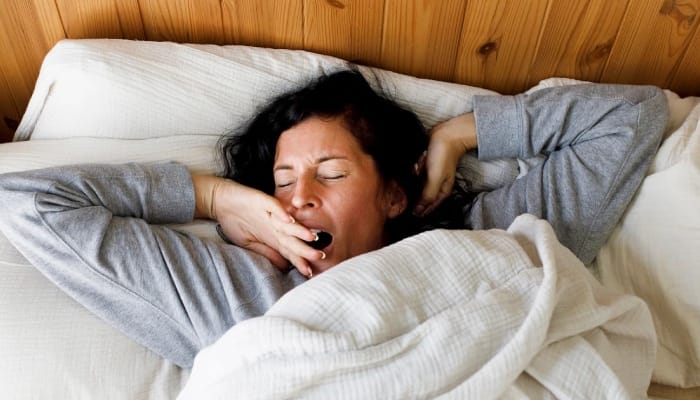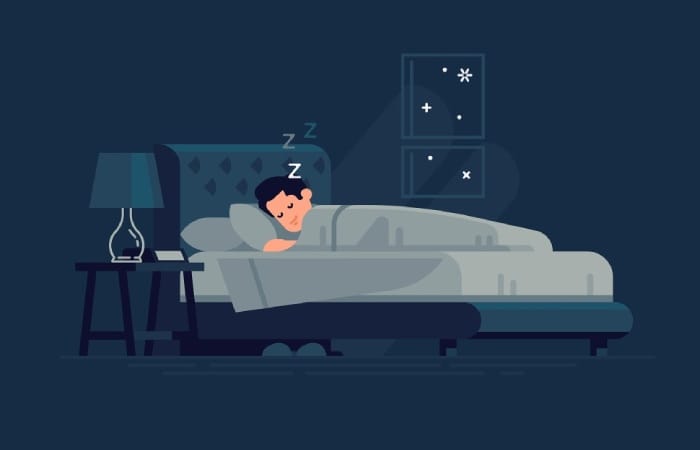
Blog
sleep

The importance of sleep for physical and mental health is undeniable. Therefore, to have quality sleep, observing good sleep habits and conditions is essential. It can be said that when you think you are asleep, in fact, your brain is framing true sleep.
فهرست عناوین
ToggleSleeping and dreaming are very important. It can be said that a person’s dreams are a continuation of life in another form. For this reason, dreams are rich symbols for accessing the unconscious, which was previously the focus of Freud and the followers of psychoanalysis.
What is sleep?
Scientifically, sleep is an altered state of brain activity that is completely different from the waking state. Sleep is a process of restoring physical and mental energy. During sleep cycles, brain cells are slowly active. The brain’s activity during sleep is recorded and shown by a device called EEG. To better understand the phenomenon of sleep, it is better to first explain its stages.
Stages of Sleep
Sleep is not a uniform process. Rather, it consists of cycles that repeat several times throughout the night. Each sleep cycle consists of four distinct stages. In a typical night, a person experiences four to six cycles of the four-stage sleep.
- Stage NREM1: The first stage is the dozing stage, which is shorter than the other stages. In this stage, the body is not completely relaxed, and the eyes are moving, but physical and brain activities slow down.
- Stage NREM2: In the second stage, the body enters a calmer state. Signs of this stage include decreased body temperature, muscle relaxation, slower breathing and heart rate, and cessation of eye movements.
- Stage NREM3: The third stage is known as deep sleep. Brain activity during this period shows a pattern of delta brain waves; therefore, this stage is also called delta sleep or slow-wave sleep. According to researchers, deep sleep is vital for the body.
- Stage REM: After the three NREM stages comes the REM stage. In the REM stage, brain activity increases and approaches the waking state, which shows the brain’s resistance to waking up due to disturbances. This stage is essential for cognitive functions such as memory and learning. Dreams are vivid during this stage.
How does dreaming occur?
Some people confuse imagination and fantasy with dreaming, which is considered a disorder. In fact, the process of falling asleep in humans lasts from 30 seconds to 8 minutes, and if this period is not properly completed, the person experiences a state similar to sleep rather than full sleep—like someone staring at the horizon and lost in their imagination. After this time period, the brain experiences different sleep waves, which we will briefly review next.

Sleep Waves
- Alpha Waves: The duration a person experiences alpha waves is 20 to 30 minutes, which varies depending on individuals’ physiological conditions.
- Delta Waves: These waves last about 90 minutes and create deep sleep for the person. These waves occur in 25-minute cycles, meaning first 25 minutes of light sleep, then 25 minutes of deep sleep, and 25 minutes of semi-light sleep.
After these 85 to 90 minutes, the person dreams for about 5 minutes. In other words, a person who sleeps 7 to 8 hours on average dreams about 5 times. These dreams are not necessarily connected and, depending on the person’s physiological condition and nutrition, they can have different themes or durations.
The dreaming process can be analyzed and examined with sleep-monitoring devices so that the duration of dreaming can be measured. Laboratory studies have shown that individuals dream in 20 to 25 minute periods. The length of dreaming indicates the type of disorder and provides other important information about the person.
Delta waves are recognized as sleep waves and affect sleep quality. In other words, the deepest level of sleep occurs during delta waves. - Theta Waves: The newest discovered brain wave and one of the most complex brain waves. These waves come before deep sleep and are also seen during meditation.
Suggested article: The brain has no off button
Why do some people remember their dreams?
All humans dream throughout the night; it is actually impossible for a person not to dream. However, some people remember their dreams because they do not experience deep sleep.
These people show disorganized sleep systems because the deep sleep stage is less than normal or completely absent. In these individuals, the interval between the first light sleep and the second semi-light sleep is shorter than normal. Therefore, the person remembers their dreams after waking. Normally, if a person’s sleep cycle is complete and they experience deep sleep, they should not remember their dreams.
Why do some people think they dreamed all night?
If the duration of deep sleep decreases, a connection is formed between light sleep phases, and the waves interfere with each other, causing the person to think they were dreaming all night.

5 Factors Affecting Sleep Quality
Poor Nutrition: Some bad eating habits can directly affect your sleep quality. For this reason, we suggest the following tips to improve sleep quality:
- Avoid caffeine such as tea and coffee 4 hours before sleep.
- Avoid spicy foods with dinner.
- Do not eat high-fat or high-calorie dinners and avoid eating fruit immediately after dinner.
Lifestyle: Factors such as using a mobile phone or watching TV before sleep, staying up late, using sleeping pills, inappropriate lighting, and unsuitable bedroom temperature affect sleep quality.
Sleeping in Appropriate Light: The sleeping place should be dark; on the other hand, sleeping during the day is generally not recommended.
- Waking Up Naturally: Let your body wake up automatically according to its own needs, not by an alarm clock, because alarms disrupt the sleep cycle.
- Appropriate Room Temperature: The bedroom temperature should be balanced because too hot or too cold air causes sleep disturbances.
- Wearing Comfortable and Suitable Clothing for Sleep
Disturbed Mental State: Anxious people or those with repetitive negative thoughts (ruminations), who dwell in illusions and unresolved psychological issues, experience lower sleep quality. It is recommended to bring up the problems and issues you face into your conscious mind and not suppress them because suppression pushes them into your unconscious layers and causes restless sleep. Therefore, try to resolve mental open files before sleeping.
Avoid Talking About Your Poor Sleep Quality: Constant complaining about light sleep or disturbing dreams makes the brain gradually focus on these topics and make them permanent.
Do Not Bring Your Thoughts and Plans to Bed: Avoid eating, listening to music, watching movies, or spending time in bed doing activities other than sleeping, because the bedroom is for sleep, not other activities.

Importance of Sleep Quality
- Damage to physiology and dysfunction of the body’s normal functions is one of the effects of poor-quality sleep. People without regular, proper sleep gradually wear out physically.
- Memory impairment, lack of concentration, and difficulty in decision-making are other consequences of poor-quality sleep.
- Chronic diseases, especially heart diseases.
- Effects on facial beauty and physical growth.
- Impact on physical, psychological, and sexual performance.
- Effects on future generations through genetics and upbringing.
It can be said that people who do not have sufficient and proper sleep will not perform well in daily life because sleep performs two essential functions: first, it consolidates the information we receive throughout the day, and second, it repairs and regenerates the body and mind.
Benefits of Adequate Sleep for the Body
Adequate sleep is one of the most important factors influencing the health of body and mind. Below are some benefits of sufficient sleep:
Proper Brain Processing and Readiness for Challenges
One of the brain’s functions during sleep is processing emotions and information. The brain needs this time to recognize signals and respond appropriately to situations. People without a complete sleep cycle exhibit more negative emotional reactions such as aggression. Studies show that people suffering from insomnia are five times more likely to develop depression. Insomnia also increases the risk of anxiety disorders and panic attacks. Therefore, adequate sleep prepares the brain to face challenges.
Blood Pressure Reduction
High blood pressure causes strokes and, if chronic, can lead to cardiac arrest. During sleep, breathing slows, and the heart rate decreases. In this state, the heart and blood vessels have low activity. So, if the sleep cycle is complete, the circulatory system rests and blood pressure lowers.
Fighting Microbes
Continuous lack of sleep changes how immune cells function. If the sleep cycle is incomplete, immune cells cannot properly defend the body, increasing susceptibility to illness. Complete nightly rest can trigger the release of hormones responsible for clearing metabolic waste accumulated during waking hours, thereby aiding the immune system and minimizing fatigue, weariness, and sickness.
Weight Control
When sleep is sufficient, feelings of hunger decrease. Sleep deprivation disrupts hormones that regulate appetite. This imbalance weakens resistance to food temptations, especially unhealthy foods. Moreover, inadequate sleep causes fatigue, reducing physical activity and exercise motivation, which gradually leads to weight gain.
Improving Memory Power
During sleep, the brain decides which of the information received throughout the day is worth keeping and filing away, and which should be forgotten. This process is done to free up space for storing new information. German researchers believe that sleep improves memory, so that the brain is more efficient at consolidating memories during sleep than when awake.
Other Factors Affecting Sleep
Various factors can disrupt the sleep cycle, including stress or anxiety, pain or disorders in organs such as heartburn or asthma, some medications or caffeinated beverages like coffee, tea, and soda, alcohol, untreated sleep disorders like sleep apnea or insomnia. Age is one of the most important factors affecting the sleep cycle.
Regarding sleep quality, older adults spend more time in light sleep and less time in deep and REM sleep. Light sleep provides less restfulness. Therefore, older people wake up on average three or four times during the night.
The light environment of the sleeping area significantly affects sleep quality. Melatonin is a hormone secreted by the pineal gland at night and is produced in most living creatures. This hormone plays a major role in regulating the sleep-wake cycle. At night and in darkness, melatonin levels in the body increase, initiating the sleep cycle. If the brain cannot produce enough melatonin, the person does not feel sleepy and the sleep cycle is disrupted.
The mechanism of melatonin secretion is linked to sunlight. Sunlight contains a large amount of blue light, which has a strong effect on the human nervous system. Our cave-dwelling ancestors synchronized their activities with sunlight, going to their shelters to sleep at sunset and waking at sunrise. Gradually, the human body became conditioned to secrete melatonin when blue light is absent, causing feelings of fatigue and slowly falling asleep.
However, with the discovery of fire and candles, this cycle changed, and humans were able to delay their natural sleep time by controlling lighting. Nowadays, due to artificial lights such as lamps, TV screens, mobile phones, computers, and so on, melatonin secretion in the brain is delayed, and REM sleep is seriously disrupted.
You can improve sleep quality by understanding and monitoring your biological clock and sleep cycles. By doing this, you can set a fixed and specific time for sleep so that your mind gradually becomes conditioned and ready for the sleep cycle.
To maintain this routine, you should avoid electronic screens emitting blue light for two hours before sleep and reduce the light and temperature of the sleeping environment.
Additionally, you can dedicate one hour before sleep to relaxing activities such as reading a few lines from your favorite book, taking a warm bath, or doing light stretching exercises.
برای مشاوره رایگان و رزرو وقت (یا اگر تماس گرفتید و قادر به پاسخگویی نبودیم) شماره تماس خود را وارد کنید. ما به زودی با شما تماس می گیریم!



